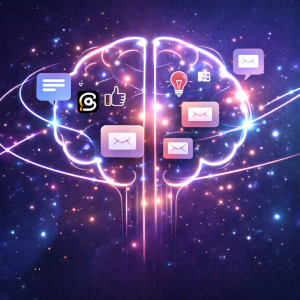
Online creativity groups and mental wellbeing
Online creativity groups and mental wellbeing
By
64 Million Artists
Chris Rolls, 64 Million Artists and Dr. Rachel H. Tribe, clinical psychologist based at UC look at how online creative groups can contribute to positive mental wellbeing.
We know that engaging in the visual arts contributes to positive mental wellbeing by establishing purposeful activity and positive emotions, helping to make connections, providing continuous learning opportunities and developing a sense of achievement. Creativity-based group projects support many of these – but do they also work online?
As many traditionally ‘offline’ groups and organisations are rapidly learning how to operate and thrive online, this is an important question.
At 64 Million Artists run creativity-based participation projects which are fun, free, and focused on wellbeing. We responded to the current coranvirus situation with ‘Create to Connect’: two weeks of fun, free creative challenges anyone can take part in if they’re isolating, distancing, or working from home.
Our flagship campaign, ‘The January Challenge’, engaged thousands in simple challenges based on drawing, craft, mindfulness, movement and cooking. Many organisations are now regular challengers, including hospitals, libraries and museums. They take part to boost their workplace wellbeing.
Evidence gap on virtual creativity
Our participants regularly tell us that taking part in our creative challenge programmes makes them feel good.There is already evidence on the wellbeing impact of art and culture activities, but very little on online creativity-based interventions where participants meet in virtual spaces. We investigated what specific elements improve their mood.
We partnered with UCL Division of Psychology and Life Sciences to design a project, Creativity in Mind, for people self-reporting low mood and anxiety. They were invited to take part in 30 days of creative challenges and asked to post their work and experiences in WhatsApp groups. Members of 64 Million Artists facilitated and were in constant dialogue with a clinical psychologist from UCL who was also a silent member of the group.
The three groups were asked to fill in questionnaires to assess their levels of stress, depression and anxiety, as well as their wellbeing, against clinical scales. They were measured before, immediately after, and two months following the 30 day programme. UCL also conducted interviews with randomly selected participants to identify key themes and pinpoint the crucial change agents in their experience.
Key findings
Dr Rachel H. Tribe’s qualitative and quantitative findings were that:
- users’ symptoms decreased overall, according to the depression, anxiety and stress scale (DASS)
- wellbeing increased to a level of clinical significance on the The Warwick-Edinburgh Mental Wellbeing Scale (WEMWBS)
- Creativity in Mind’s mechanism of change fits into three broad categories:
(1) The structure of daily online prompts
(2) Being creative as a discovery and a distraction
(3) creative sharing with a supportive group one is accountable to.
- creativity itself was perceived by users to a key part of their positive experience, something which champions of creativity in healthcare settings will be encouraged to hear.
One of the Creativity in Mind participants took part in challenges inviting her to get out and engage with her local environment. She later revealed that she had taken part only in her imagination, as she was physically disabled and housebound. This study adds to existing research showing that digital platforms can play a role in relieving social isolation. It also has promising implications for social prescribing.
At 64 Million Artists we’re keen to explore and develop the positive results of Creativity in Mind. This includes exploring co-created research design methodologies. If you’d like more information, please contact us.
Chris is a Senior Project Manager for 64 Million Artists, leading on mental health and wellbeing projects.
Rachel is a clinical psychologist based at UCL.
First published on What Works Wellbeing
Create to Connect
In times like these, we recognise the importance of bringing people together, and know lots of you won’t be able to meet up in the same way as before. Create to Connect is a response to the impact of Covid-19 – an invitation to get creative at home and with others in your community – and see what happens along the way.
64 Million Artists will be hosting a month of daily creative challenges in May. This will be in collaboration with 31 different partners – including schools, libraries, workplaces, hospitals, community centres and more! This month of challenges is specifically designed to boost wellbeing and keep communities connected, curious and creative in uncertain times.
Alongside the daily challenges, they will be distributing free tailored activity packs that enable you to engage others in your communities in the challenges. Please let them know if you would like to receive a pack by emailing hello@64millionartists.com
64 Million Artists trialled Create to Connect with two weeks of mini creative challenges from 23rd March – 5th April. You can find those challenges here.







